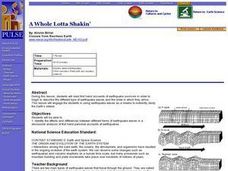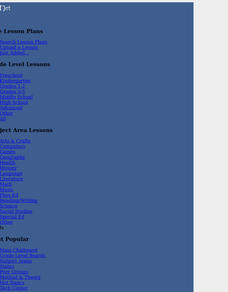Biology Junction
Cnidarians and Ctenophorans
Cnidaria is a broad phylum of 11,000 different species from jellyfish to coral. Most Cnidarians are marine species with a few freshwater examples. A lesson presentation explains the important characteristics of different species of...
Curated OER
Rock Cycle
In this rock cycle worksheet, students simulate the changes that occur during the rock cycle using a sugar cube. They use the sugar cube to represent a rock and perform changes on the sugar cube that represent the stages of the rock cycle.
Curated OER
Simple Machines
In this simple machine worksheet, students review the definitions of different simple machines including levers, wheels, and inclined planes. Students match the 7 words to their definitions and then place the words in to a word puzzle.
Curated OER
Building a Better Sentence
Sentence construction is both a science and an art. This bare bones lesson ties an analysis of earth's geology to sentence formation. Although referenced as a major part of the activity, there are no links to the technology or resources...
Curated OER
Which Boundary Am I?
Sixth graders find 12 statements which describe the characteristics of the three boundary types, arranged in random order. Their task is to read each statement, and then CUT and PASTE it to the the appropriate boundary icon.
American Chemical Society
Colors Collide or Combine?
As part of a unit investigating the dissolving of M&Ms® candy coating, this instructional activity examines whether or not the different colors combine. There are no new concepts revealed in this particular instructional activity,...
Curated OER
Prehistoric Mesosaurus
Students draw conclusions why Mesosaurus has only been found in Africa and Brazil and how its fossil remains serve as important evidence that shows where two continents were once joined together.
Curated OER
What is the Rock Cycle and Its Processes?
Geology beginners examine three different rock samples and determine their origin by their characteristics. By making and recording observations, they become familiar with features of igneous, metamorphic, and sedimentary rock types....
Curated OER
Earth History Part II
Eighth graders hypothesize what caused the break up of continents. In this earth science lesson, 8th graders study about the events that took place during Mesozoic and Cenozoic Era. They reconstruct a supercontinent and report their...
Curated OER
Volcanoes
A thorough description of volcanoes appears in this Earth science worksheet. Students read facts about volcanoes and answer 20 multiple choice comprehension questions. The answers appear at the end of the worksheet.
Curated OER
Let's Take a Rock Apart!
Students examine a crushed rock and sort the minerals they find in that rock by color and other properties.
Curated OER
Slinky Lab- Simulating the Motion of Earthquake Waves
Sixth graders simulate primary and secondary waves. In this earthquakes waves lesson, 6th graders experiment using a slinky to gain understanding of how waves are created during an earthquake. Students record observations in drawings....
Curated OER
Earthquakes: Getting Ready For The Big One
Students devise a plan to prepare a city for an earthquake. In this lesson plan on earthquakes, students differentiate between the different types of earthquakes, examine the impact they can have on a city, and write a proposal on how to...
Curated OER
Shake, Rattle and Roll
Sixth graders explore the causes and effects of earthquakes. They also collect and analyze data in graphs. They also use the Internet to research earthquakes
Curated OER
Plotting Earthquakes
Learners explore earthquakes. Using the National Earthquake Information Center website, students plot daily earthquakes on a map. They observe the magnitude of each earthquake. Learners identify the pattern of earthquake locations and...
Curated OER
A Whole Lotta Shakin'
Students read first hand accounts of earthquake survivors in order to begin the describe the different types of earthquake waves and the order in which they arrive. They engage in using earthquake waves as a means to indirectly study the...
Curated OER
Forces Inside the Earth
In this faults worksheet, students identify the three types of faults and the characteristics that define a normal fault, reverse fault, and a strike-slip fault. This worksheet has 3 fill in the blank and 3 short answer questions.
Curated OER
Life and Geologic Time
For this geologic time worksheet, students will define the difference between eras, periods, and epochs in the geologic time scale. Students will also look at the role of geological events and fossils. This worksheet has 10 short answer...
Curated OER
Conduction, Convection and Radiation
Sixth graders listen to descriptions of types of heat to gain background knowledge In this heat lesson, 6th graders perform experiments to understand various types of heat transfer (convection, conduction and radiation.) Students assess...
Curated OER
Earthquakes Study Guide
In this earthquakes worksheet, students answer questions about the components of earthquakes, the causes of earthquakes, how they are measured, the types of seismic waves and the types of faults. They also answer questions about the...
Curated OER
Position and Velocity vs. Time Graphs
In this position and velocity worksheet, students sketch graphs of position vs. velocity and position vs. time for 6 problems given different scenarios. They label their graphs with given positions, velocities and times.
Curated OER
Earthquake Epicenter
Students use chart data to determine the location of the epicenter of an earthquake. This task assesses students' abilities to generalize and infer, organize data, interpret data, and apply mathematical concepts.
Curated OER
Surface to Volume Ratios
Students measure the rate of diffusion and to calculate the surface area to volume ratios of varying cell sizes. The lesson is very clearly organized with a useful student worksheet provided. They perform a lab experiment which is...
Curated OER
Seed Surprises
Students investigate seeds and their growth. In this agriculture instructional activity, students read the book How a Seed Grows and discuss the seed cycle. Students examine real seeds and identify their properties. Students create a set...























